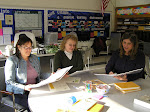It is essential that students plan carefully and rehearse sufficiently.
Direct cast members to speak directly to the audience, not to each other. (There may be some special times when you will break this rule and ask characters on stage to look at and react to each other). Generally, however, cast members will focus upon the audience just as a storyteller focuses upon the listeners. This engages the audience and helps them identify with the characters.
It may be appropriate for readers who are not reading at the moment, however, to focus on the person reading.
During rehearsals, encourage students to explore each character part in as much depth as time allows. Emphasizing eye contact, diction, character development, controlled movement or mime, and performance energy will help achieve a well-paced, well-rehearsed performance.
To lessen self-consciousness, it is sometimes helpful for cast members to focus eyes slightly above the heads of audience members.
Encourage the use of appropriate vocal and volume changes, facial expressions, posture, and varying tempo patterns.
Staging “rules” are just guidelines. When students ask to include costumes and props, firmly suggest that they be symbolic and minimal. Encourage creative thinking rather than elaborate productions. The idea is to spark the imagination of the audience through verbal expression rather than visual stimulation. But if you would rather fight other battles, focus on the literacy benefits and/or the presentation of important content material.
Platforms, chairs, stools, and such are useful to suggest environment and/or relationships. Thoughtful consideration should also be given to the arrangement of the readers.
Movement should also be minimal and often symbolic. In most cases, the performers position themselves in one place and stay there. Leaving a “scene” may be suggested by turning so the performer’s back is to the audience or by sitting down. Walking can be done in place. Hand gestures and facial expression, however, are encouraged.
Encourage students to find out what unfamiliar words mean. It is up to you how they do it, but the fastest method might be best because your primary goal should be help the student add those words to his/her vocabulary, and using them in a Readers’ Theatre production will accomplish this. You or other classmates might be a better resource than a dictionary so that the student, especially those who have reading difficulties, is not discouraged.
For shorter scripts (four pages or less), mount them on card stock for handling ease. For longer scripts, binders are recommended. Even music stands can be used for older student who would not be blocked by them. Music stands have the advantage of freeing both hands. Every student should have his/her own script. Strongly recommend that each reader highlight his/her own lines.
Monday, March 10, 2008
Subscribe to:
Post Comments (Atom)

No comments:
Post a Comment